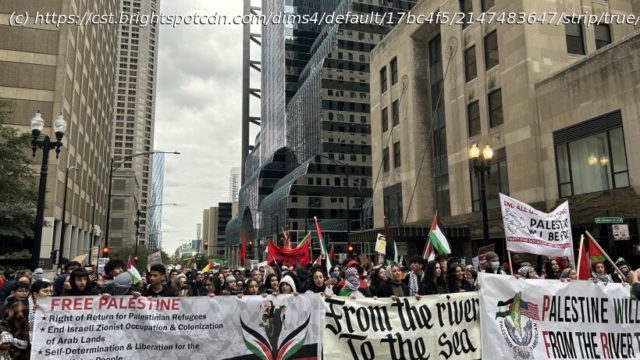The decades-old chant is being heard around the world in recent weeks — including at protests in Chicago. In our efforts to cover the local impact of the war, we examine its history, what it means to Palestinians, why it has been the center of global controversy.
As Palestinian protesters have taken to the streets around the world after the onset of the Israel-Hamas war, a decades-old refrain is being chanted and appearing on signs and banners in Chicago and elsewhere in recent weeks:
“From the river to the sea, Palestine will be free.”
For Palestinians, the phrase has been a rallying call for decades, signifying what they believe is their right to peacefully return to the land that is now Israel. About 700,000 Palestinians — approximately 85% of the Arab population — were expelled or forced to flee in 1948, when Israel declared independence after the United Nations voted to divide Palestine into Jewish and Arab states. In the 1967 war, Israel expanded the territory under its control and has since occupied the Gaza Strip and West Bank. It has blockaded Gaza since 2007, after Hamas took control of the strip.
But the phrase has been the subject of global controversy, with some seeing it as antisemitic or even dangerous, especially after it was adopted by Hamas. The Palestinian militant group attacked Israeli towns on Oct. 7, the Jewish holiday of Simchat Torah, sparking the current war with Israel that has taken more than 1,400 Israeli lives and more than 7,000 Palestinian lives.
Soon after, a planned pro-Palestinian protest in Vienna was banned after the slogan was mentioned in publicity material. British Home Secretary Suella Braverman recently called the slogan a “staple of antisemitic discourse.”
And in 2018, CNN fired a commentator after he said the phrase at an International Day of Solidarity with the Palestinian People at the United Nations. He later apologized.
The dispute over the phrase, said Wendy Pearlman, a professor of Middle East studies at Northwestern University, is a microcosm of the entire Israel-Palestinian dispute.
“It is a conflict of two peoples who both view this land as their historic homeland,” she said.
The phrase has been in use since the 1960s — originally, in Arabic, it was Min al-nahr ila al-bahr… filastin hurra — by the Palestine Liberation Organization, according to Jessica Winegar, a sociocultural anthropologist at Northwestern University who studies political protest and the Middle East.
It called for a restoration of the land where hundreds of thousands of Palestinians lived, from the Jordan River to the Mediterranean Sea, before they left or were forced to leave with the establishment of Israel in 1948, Winegar said.






